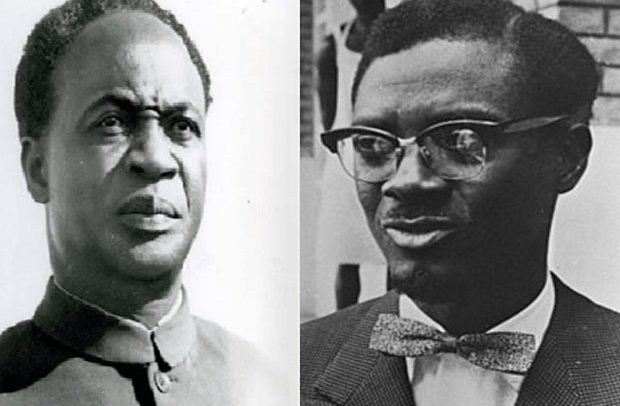Kwame Nkrumah and Patrice Lumumba
In answering the above question relating to the All-African People’s Conference (AAPC) that took place in Accra 60 years ago – from the 5th to the 8th of December 1958 – some people may dispute the implied answer that such a rhetorical question tacitly provides.
Many people might opt for the Conference in Addis Ababa in May 1963, at which the African Union (AU), in its previous guise as the Organisation of African Unity (OAU), was born.
But they would not be right, for the OAU was formed by independent African states. African countries needed to achieve independence first before they could form the OAU! And it was participants of the AAPC, drawn from countries that were still labouring under the colonial yoke, who left the AAPC to intensify their struggle for independence that ended in victory for them, and gave them the independence that qualified them to form the OAU.
To those of us who were blessed to be alive at the time, the AAPC was an unbelievable gathering.
Its chairman Mr Tom Mboya was from Kenya, a country whose black population had taken up arms to drive away a white settler population that had seized their lands and turned the lands into “White Highlands.”
The leader of the Kenyan freedom fighters, Jomo Kenyatta, was arguably the most famous blackman in Africa at the time.
The British Government feared him so much that it had passed a 7-year prison sentence on him after branding the independence movement he led as a “terrorist” organisation. The real name of his secret guerrilla movement could not be detected by them and they gave it an invented name, “Mau Mau”, which was unknown in any Kenyan language!
We, in Ghana, were fascinated by the Kenya story. Our own leaders, including Dr Kwame Nkrumah, had only been imprisoned for a few weeks, following the riots of 1948. Within three years, we had African Ministers in a Cabinet under a “Leader of Government Business,” Dr Kwame Nkrumah. We knew nothing whatsoever about Kenya and its white settler politics. But before Tom Mboya left Accra, we had been tutored to know that not all British colonies in Africa were being treated with kid gloves like Ghana. The problems of other colonised African countries were also revealed to us.
It was Tom Mboya who gave the AAPC its indelible mandate by declaring that “in 1884, the colonialists undertook ‘The scramble for Africa’. Well, we are telling them today that the time has come for them to ‘Scram from Africa!.
The cheers that greeted Tom Mboya’s words went round the whole African continent. Jomo Kenyatta was soon released from prison. He became Kenya’s first African Prime Minister and later President (1964).
The other person who attended the AAPC and later became immortally famous was Patrice Lumumba of the Belgian Congo (as it was then.) His eloquence and intelligence got him put on the Steering Committee of the AAPC. He went back to the Congo more determined than ever to fight for a unitary state, aware as he was that “balkanisation” of any country would weaken it and make it impossible for it to achieve full development.
The Congo is twice the size of Western Europe, and as it had very little infrastructure at the time, trying to form a party that would cater for all its provinces was a herculean task.
Nevertheless Lumumba took up the challenge, and in the elections that were held just before the country was granted its independence by Belgium in June 1960, Lumumba’s party, the MNC, emerged the largest party in the Congolese National Assembly. In order to maintain the Congo as a unitary state, Lumumba forged alliances with other politicians whom he did not quite trust, especially Joseph Kasavubu, whom Lumumba made President, while he himself became Prime Minister.
But the Belgians used Kasavubu and other politicians, especially Moise Tshombe of Katanga Province, to undermine Lumumba and eventually, with Belgian and American assistance, his deadliest enemy, Tshombe, managed to get him captured and murdered.
Since Lumumba’s murder in 1961, the Congo has never managed to achieve real stability and its vast mineral wealth has been at the disposal of foreign companies and the corrupt Congolese politicians who serve as their stooges.
Also present at the AAP in December 1958 were delegations from South Africa, the (then) two Rhodesias and Nyasaland (now Malawi), as well as the Portuguese territories of Angola, Mozambique and Guinea-Bissau/Cape Verde.
The remaining British territories – including Gambia, Sierra Leone and Uganda – all achieved their independence after the 1958 AAPC.
France too gave independence to its many African territories, although it retained a hand in the purse-strings of those who voted “Yes” in a referendum, held in 1958, to determine their future political status.
Guinea voted “No”, and was immediately “thrown to the wolves” by France. France withdrew all its technical and other personnel from Guinea. As they left, they emptied the Guinea treasury, took away typewriters and pulled telephone wires off the walls.
Of course, not all the Africans who have held the reins of governments in their own countries since the AAPC have comported themselves in a manner that makes other African countries look upon them with pride. But where can anyone find governments that do not make mistakes? So, long live the ideals of the AAPC!
By Cameron Duodu
www.cameronduodu.com


